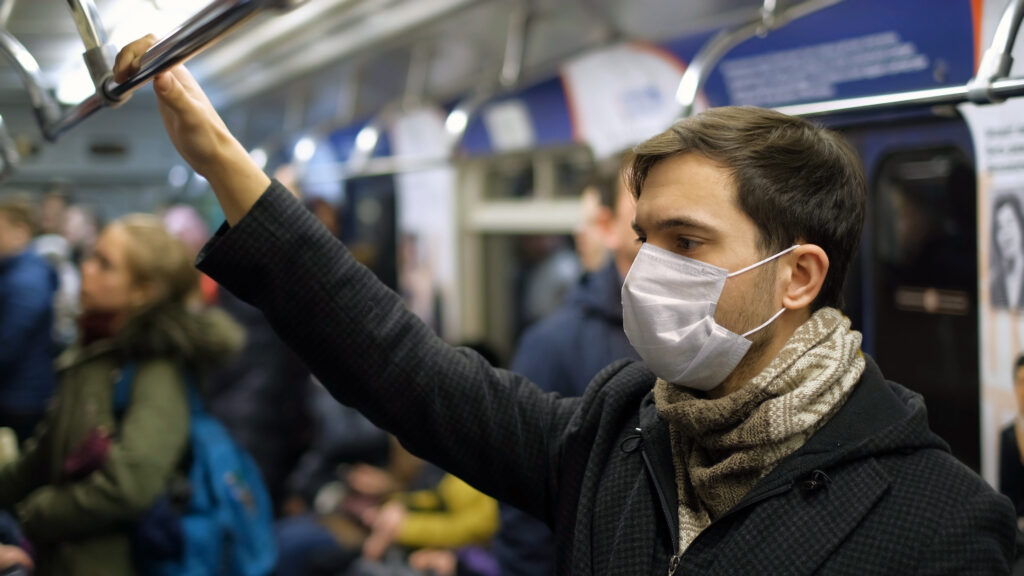Smarter working in the age of COVID-19 – what does this mean for members in BT?
This article is more than a year old
The coronavirus pandemic has changed all our lives – at home and at work – with many of us experiencing even more uncertainty and fear as we slowly emerge from lockdown.

A commuter wearing a mask during the coronavirus pandemic
Prospect members in BT have been pivotal in keeping the UK connected while people were stuck in their homes.
Many of those members have successfully worked from home – and where anyone needed to be office-based or out in the field, we have been involved in ensuring that safety measures are in place to ensure social distancing and reduce the risks of transmission.
Phased return to work
Prospect has held regular meetings with BT throughout to consider the impact of COVID-19 on employees, including when and to what level the offices will be reoccupied.
BT had originally proposed to begin repopulating the office estate from the start of June, but the nature of the crisis led both the union and employer to recognise this was neither realistic nor safe.
As I write, BT is looking to start a phased return to office working in September, assuming there is no further outbreak and lockdown.
Prospect has broadly supported this careful and considered approach. We have encouraged BT not to be rigid and to focus on those roles that cannot be performed remotely.
We also know some members are struggling with remote working and we are encouraging the company to accommodate their needs without increasing the risk to colleagues who need to be in the office.
Workplace of the future
Many questions are emerging about how the future workplace will look in the light of the lessons of the pandemic. We welcome a recent BT research paper that not only recognises the profound impact of COVID-19 on office working, but also reimagines the workplace in a post-COVID world.
The digital revolution, coronavirus pandemic, climate emergency, and the economic crisis have all sown the seeds of change, suggests the paper, How coronavirus is reshaping remote and office working.
In an introductory blog author Dr Nicola Millard says: “…research has shown that homeworkers are around 20% more productive than their office-based counterparts. But, as many of us have recently discovered, long-term homeworking can be hard when some people feel as if they’re living at work. Isolation and burnout can be issues.”
The paper points to several large companies who are reconsidering the way they do things. One study suggests that 74% of chief financial officers intend to shift some employees (between 5-20%) to permanent remote working because they can see opportunities to reduce costs and boost productivity.
Employees are also positive about the shift to remote working. An IBM study found that 54% of Americans want to keep it as their primary mode of work, and 70% would like it to be an option.
The paper cites advantages of being in the office, such as a locked door; specialist equipment; the chance to collaborate; and a space to work for people who live in cramped accommodation, mainly those who are younger. It acknowledges that many roles such as the emergency services or retail cannot be carried out at home.
But it also highlights the risks of both office and homeworking. Working in the office may require commuting on public transport; during social distancing people have to actively avoid each other so reducing the chance to collaborate.
At home one danger is the potential higher use of tracking technology to monitor people. Also, home workers must have connectivity and the right equipment.
Ultimately, suggests Nicola Millard, the discussion shouldn’t be about office versus remote, but flexibility based on employee preferences and roles. “It’s about enabling individuals to work smarter, wherever they happen to be,” she argues.
Aberdeen site closure
So what does all this mean for our members? Prospect certainly welcomes a perspective that provides more choice and flexibility for employees to be based wherever they can get their best work done, including away from the office.
One piece of immediate learning relates to the planned closure of the Aberdeen office where BT is currently consulting with the unions about 140 redundancies
We submitted detailed counter proposals for BT and Openreach, arguing that those already working effectively from home because of the pandemic could carry on doing this.
The alternative is redundancy and their work being handed over to others who are also likely to be working from home due to the pandemic.
However, some people cannot do their jobs from home or prefer to be office based. Therefore we asked BT to provide alternative accommodation in Aberdeen for this group.
We will, of course, support those members wishing to leave by helping them achieve the best possible package.
Unfortunately BT has rejected our counter proposal but the Aberdeen experience is a forerunner of many similar consultations as part of the far-reaching Better Workplaces relocation programme, which was drawn up before the pandemic.
Wider relocation strategy
We will want to talk to the company about how the landscape has changed and the potential impact on Better Workplaces. We will want to explore whether proposals made before the pandemic to centralise and rationalise the BT estate into fewer larger sites are still right in the light of the lessons of the pandemic.
There are more questions than answers and everyone is still waiting to see how this pans out. As your union, we are not in favour of simply turning temporary arrangements into permanent ones without proper consultation and agreement.
However, everyone’s world has changed and we need to change with it, which includes taking seriously the issues raised in BT’s own paper.
John Ferrett is Prospect national secretary for members in BT and Digital.